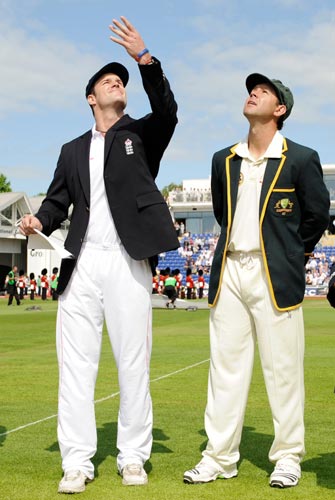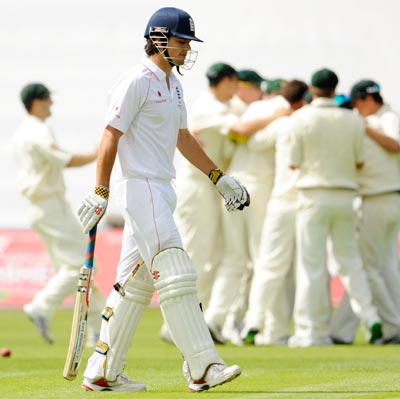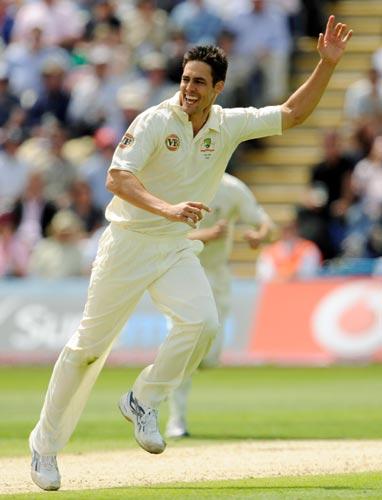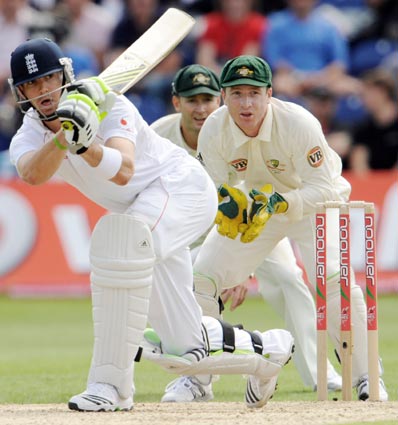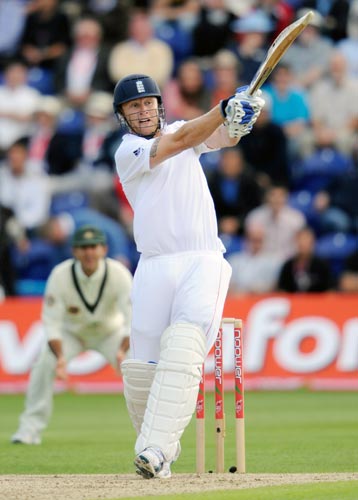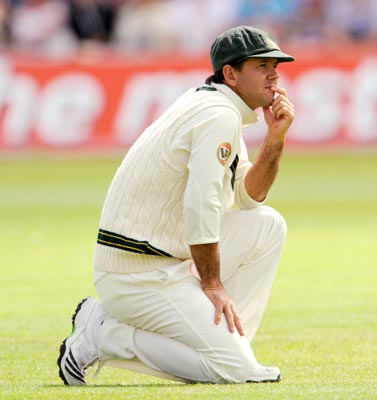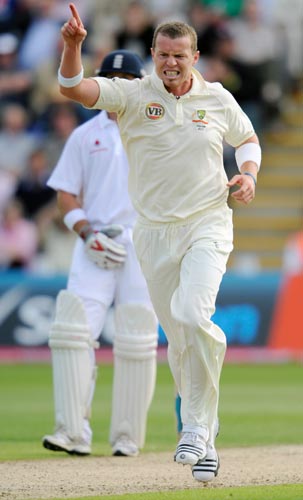 | « Back to article | Print this article |
The coin landed in England's favour
Fortunes ebbed and flowed in the best tradition of Ashes cricket on Wednesday after the heady but less substantial delights of the Twenty20 World Cup last month.
Wales welcomed the first Ashes Test staged on neutral territory with anthems, a warm sunny day and a pitch which could decide the destiny of the first Test between England and Australia.
At the end of the opening day, honours were pretty much even with England 336 for seven after selecting two spinners and electing to bat first.
Not quite the beginning
The home team had a forgettable start.
Ben Hilfenhaus made the breakthrough for Australia when Alastair Cook (10) fended a wide delivery to gully where Michael Hussey dived acrobatically to his right to take the catch.
England 21 for one after eight overs.
Johnson strikes twice
England captain Andrew Strauss reached 30 before Mitchell Johnson got a delivery to lift spitefully at his throat.
The ball brushed Strauss's glove and lobbed high over the slip cordon for Michael Clarke to take the catch running back.
Ravi Bopara (35) mixed sublime drives with a series of streaky shots but appeared to be settling down when Johnson held the ball back with no discernible change in action.
Bopara was too early on the shot and ballooned the ball to Phillip Hughes at cover.
Johnson's twin strikes reduced the hosts to 90 for three in the opening session.
Pietersen, Collinwood revive English fortunes
The consensus before the match, based on county games this season, was that the pitch would be slow, low and take spin.
Both captains clearly agreed after examining the wicket carefully over the past two days.
England included Graeme Swann and Monty Panesar, two men who turn the ball in different directions, while Australia picked off-spinner Nathan Hauritz even though his two wickets on tour had cost 260 runs.
Kevin Pietersen (69) and Paul Collingwood (64) responded by adding 138 for the fourth wicket and batting throughout the afternoon session.
Flintoff inspired some of the loudest applause
Their dismissals after tea gave Australia the edge before England seized the initiative again with a lively partnership of 86 between Matt Prior (56) and Andrew Flintoff (37).
"It's not too difficult to bat on, it's slow. You really had to bide your time, it was quite nice once you got in. But the ball kept swinging today," said Pietersen, who revealed the ball had brushed his helmet when an attempted sweep off Hauritz ended up in Simon Katich's hands at short-leg.
Flintoff, making his comeback from injury, inspired some of the loudest applause with a fierce back foot drive for four and a majestic pull to the square-leg boundary.
Ponting was pensive throughout
Ricky Ponting did not call on Hauritz until the afternoon session and when he did, he didn't get the rewards he might have had expected.
The off-spinner bowled 14 overs without looking like improving his tour figures of two for 260 and Clarke conceded 20 from five overs of his occasional left-arm spin.
Pietersen and Collingwood sensibly decided to take the many singles on offer and avoid the big shots, putting on 138 with unexciting but productive batting.
Ponting reverted to his fast bowlers after tea and the game changed direction again when Collingwood was caught behind by Brad Haddin off Hilfenhaus from an indifferent shot.
'It's not as simple as it looks'
Late wickets to Peter Siddle restored the balance, leaving 16,000 spectators thoroughly satisfied with a fine day's Test cricket.
Siddle earned due reward for a splendid display of fast bowling by dismissing both with the second new ball by dismissing both Flintoff and Prior.
Flintoff was bowled off an inside edge playing a wild, flat-footed drive and Siddle defeated Prior's attempted defensive shot to put the game back in the balance.
"It's definitely going to get dustier and drier and break up a little. It's been very difficult for the batting and the bowling because it's been so slow. It's a critical time tomorrow morning, probably for the first hour or so," said Australia coach Tim Nielsen.
"There's no doubt the wicket will deteriorate over the next couple of days. It's not as simple as it looks out there."

© Copyright 2025 Reuters Limited. All rights reserved. Republication or redistribution of Reuters content, including by framing or similar means, is expressly prohibited without the prior written consent of Reuters. Reuters shall not be liable for any errors or delays in the content, or for any actions taken in reliance thereon.
